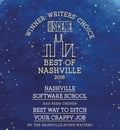I’m a big fan of hard-boiled detective fiction from the 1920s, ‘30s and ‘40s. These are stories of hard living, hard drinking, hard people. Stories of sex, drugs and murder - rock’n’roll having not yet been invented. They were wildly popular in their day and - though the trenchcoats, fedoras and smoke-filled night clubs have largely faded into the past - their legacy lives on in modern crime fiction, police procedurals and even sci-fi.
Raymond Chandler created my favorite hard-boiled detective, Phillip Marlowe. Marlowe is tough, honest, hard-working and anti-heroic enough to ignore the rules when they don’t suit him. He’s not bad, but he is hard. He’d have to be to drink so much or to recover so quickly from getting blackjacked on every other page.
He is also completely alone.
Other detectives have a partner or a secretary or a friendly police lieutenant. Marlowe has Marlowe. No one else. When he gets into a jam, he gets himself out. Or else he stays jammed.
When I sink into the pages of Chandler’s novels or short stories, I ignore the complexities of the world and let myself believe, for a while, that strength of will combined with a sarcastic edge is enough to win the day, that a lone fighter against the odds can succeed.
This is, undoubtedly, a character flaw on my part. Probably something I should work on.
Of course, the fiction of Raymond Chandler is not set in the world you and I live in. Philip Marlowe could never exist in our world, because in our world no one can survive without help from other people. No matter how much we might wish otherwise.
So what does this have to do with NSS?
Instructors are here to help
When I became an NSS instructor in the fall of 2018, I mistakenly believed that my job was to teach a class of students. This, I quickly learned, was a drastic oversimplification. It turns out the job of an instructor is to mentor, coach and help each adult in the class to become a technology professional. The problem is the term “students” implies a degree of similarity that simply isn’t there. Each person in every class is unique. Each is a combination of strengths and weaknesses, knowledge and ignorance, fear and courage.
There is, however, one trait that is common among most students: a reluctance to ask for help.
This reluctance is so common that, as instructors starting a new class, we simply assume it and immediately begin encouraging students to seek help. We nudge, we cajole, we prod and eventually we outright demand that students reach out when they get stuck or lost or don't understand. We know it’s hard, so we try to be patient, but time is short and we’ve seen what happens to those who try to go it alone.
I’ve long assumed this fear of asking for help is cultural. There’s something in the zeitgeist of this time and this place that teaches us everything we try should be easy, or at least not too difficult. That we should be able to figure it out on our own, and if we can’t it’s because there’s something wrong with us. Something other people don’t have to contend with. And something we must keep hidden.
It’s fine for other people
One thing I’ve noticed during my time as an instructor is that no student ever thinks less of any other student for asking for help. Think about that for a moment. When you see someone else asking a question or seeking a clarification, what is your response? Is it, “Oh that poor, foolish soul”?
If you’re honest with yourself, I bet a lot of times you’re thinking about how relieved you are that they asked a question that’s been on your mind. Or, if you know the answer to their question, you might find yourself thinking “Yeah, that’s a tough one. It took me a while to understand that too. If I’d asked that question, I would have learned a lot faster.”
Here’s the thing. When other people ask for help - when they acknowledge their struggle - we see them as brave. When we ask for help, we see ourselves as weak.
What kind of sense does that make?
Successful students ask for help
I’ll say this as plainly as I know how: Students who ask for help when they truly need it will succeed and students who do not will fail.
At best, students who don’t ask for help will take much longer to understand the material than those who do. This extra time would be better spent practicing the skills they’ve learned or learning something new. The programs at NSS are fast-paced. We cover a lot of material in a short amount of time, and wasted hours quickly add up to missing out on important information.
At worst, students who don’t ask for help simply do not learn. Eventually the ever-pressing wave of new material pushes them onto another subject, while leaving a gap in their understanding. And the knowledge that was meant to fill that gap will be something useful in understanding the next topic or the topic after that. Each new lesson becomes more difficult than the last. With enough gaps, the structure of their knowledge becomes shaky and unstable.
Asking for help on the job
Asking for help is not just for students. When an NSS graduate enters the workforce, they will encounter existing systems, new technologies and complex business domains that simply cannot be understood without support from people who already understand them. Employers know this, so they make evaluating a job candidate’s willingness to seek help and ask questions a key element of the interview process.
It’s a common misconception that interviewers expect you to know everything immediately, but that’s not the case. In my experience as an interviewer, I always considered it a “red flag” when a candidate didn’t ask questions or didn’t say “I don’t know” at least once. I don’t want to work with someone who cannot admit they don't understand something.
Can I ask for help too often or too early?
This is where things get really tricky. The answer is “yes”. It is possible to ask for help when you don’t (yet) need it. When you haven't struggled enough to understand on your own.
Learning is uncomfortable. It takes time and effort. That effort can be painful. Sometimes feeling that pain can motivate a student to reach out for help sooner than is useful. Before they’ve had time to really grasp the material.
Here are a few questions you can ask yourself to determine if it’s too soon to ask for help:
- Have you spent at least 25-30 minutes trying to make sense of the material? The pomodoro technique can come in handy here.
- Can you describe, in your own words, a part of the subject you’re trying to learn? It’s rare that absolutely nothing makes sense, and much more likely that you understand some of the material. You should be able to talk about what you do understand. Getting yourself a rubber duck to talk to can help.
- Can you use the understanding you have developed to construct a specific question? Or can you phrase your question in a form like “My understanding of what’s happening here is X, is that understanding correct?”
If the answer to all of these questions is “no,” you’re probably not ready to ask for help. If the answer to any of them is “yes,” it may be time to reach out.
In considering these questions keep in mind that it’s better to ask for help too early than too late. Trust your instructors to guide you if they see that you need to struggle a little more. That’s our job after all, and it’s one we enjoy doing.
Asking for what you need is a sign of strength
I have some good news. The truth is, a willingness to ask for help is a sign of strength. I bet you already know this. Think of those times when you were confused or lost and you didn’t ask for help. Did you feel strong then? Or did you feel small and afraid? I know how I’d answer that question.
It turns out there is no strength without risk and no courage without fear.
So be tough. Be strong. Not like Philip Marlowe. Like an actual adult human who lives in the real world. Ask for help when you need it. You won't regret it.
Many thanks to Josh Barton, Jean Soderkvist, Mary van Valkenburg, Heather Dixon and Charlie Penner for their help editing this post.







